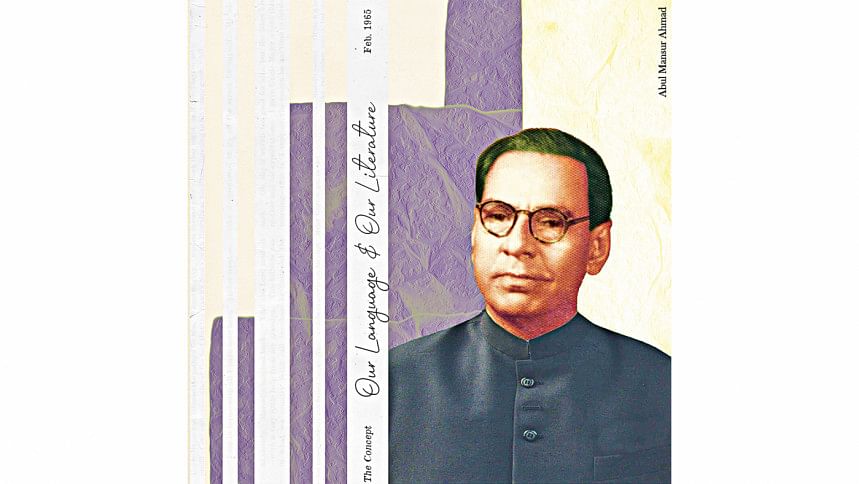Abul Mansur Ahmad (1898- 1979)

A politician and journalist by profession, Abul Mansur Ahmad began his career as a National Congress worker in Bengal. One of the principal authors of the famous "Ekush dafa," the election manifesto of Jukta Front in 1945, later on, he became minister in different capacities. A man of veritable talent, he is also one of the handful of Muslim writers from the pre-partition era who wrote alongside the predominantly Hindu Koltaka literary circle. At the time, he along with Abu Rushd and Syed Waliullah remained on the periphery of the mainstream, Kolkata-centric Bengali literary tradition, but today they are recognized as the forerunners of Bangladeshi literature.
A keen observer of social inequities and the complex socio-cultural milieu of Muslim Bengal, Abul Mansur Ahmad wrote political satires, short stories and novels. He made fun of the rigid and ridiculous social norms and practices that were particularly influenced by religious bigotry and corrupt politics. While it helped in setting his writing style apart from many of his contemporaries, it also made him a target of the Kolkata based writers who preferred the traditional writing that alluded to Sanskrit scriptures and Hindu traditions. Hence for him and many other Muslim writers, the partition of 1947 was an opportunity to improve the impoverished stature of the neglected East Bengal.
His first satire collection, Aina, was published in 1936-37, and the seven short pieces are satirical take on the contemporary Bengali Muslim society. Set in the 1920s, the practices and references might seem unfamiliar to modern day readers, but the cow protection movement and playing of music as part of Hindu festivals in front of mosques caused serious affronts in those times.
His first satire collection, Aina, was published in 1936-37, and the seven short pieces are satirical take on the contemporary Bengali Muslim society. Set in the 1920s, the practices and references might seem unfamiliar to modern day readers, but the cow protection movement and playing of music as part of Hindu festivals in front of mosques caused serious affronts in those times. One of the pieces of this collection entitled, "Dharma Rajya," depicts how a bloody conflict ensues when a musical procession passes by a mosque. The story of the fraud pir in "Huzure Kebla," however, is identifiable even in our times because such practices have continued from the beginning of time to date.
While commenting on Aina, the eminent scholar Professor Anisuzzaman said, "The target of Abul Mansur Ahmad's attach was not on any individual, a community or any particular religion. He revolted against prejudice and superstition in general. Even 80 years after the publication of Aina, there is still a need for such a book." Ahmad's Food Conference was published in 1944, three years before the partition, but it probes the ridiculous political scenario of the subcontinent that encouraged nepotism and corruption in the name of welfare of ordinary people. His other satire entitled Gullivor er Safarnama (1945) is a take on Jonathan Swift's Gulliver's Travels and reintroduces some of the famous and fictitious traveller's adventures. He has written novels and memoirs too, but he is most remembered for his cutting wit and satirical writing.
Today marks the 124th birth anniversary of Abul Mansur Ahmad.

 For all latest news, follow The Daily Star's Google News channel.
For all latest news, follow The Daily Star's Google News channel. 



Comments